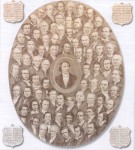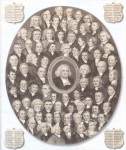This coming Sunday is one of the dates for keeping Bible Sunday - which means that it is now four years since I preached with a view at Dibley because I recall taking that as the theme for one of my services - tempus fugit.
The Bible reading (yes, there is only one!) set in the material I'm, using is tiny - Romans 15: 1 - 6 and a focus on verse 4 "everything that was written in the past was written to teach us, so that through endurance and the encouragement of the Scriptures we might have hope." So much for Baptists as lovers of the Bible when we are content with six verses.
Using the ideas in the material, I am hoping to encourage people to move beyond the 'comfort-eating' of their favourite passages or books and the 'snacking' of proof texts and tiny extracts towards a more 'balanced diet' of Old and New, familiar and strange, comforting and challenging. Perhaps they maight even like to try a larger portion - supersized Bible reading?!. I want to challenge the popular notions that the Bible is a 'how to' book or an 'answer book' and suggest as the old hymn says it is a 'book full of stories' which can teach us about ourselves and about God.
I like the Romans verse because it sees the Scriptures not as the answer to a maiden's prayer (or a young male's either) but a source of encouragement. For me, part of that encouragement comes from reading about the frail and fallen folk of bygone ages, of the times God's people got it wrong as well as the times they got it right. Part of it comes from the authenticity and honesty of the psalmists, whether in praise, despair or anger. Part of it comes because I believe the words of another old hymn "the Lord has yet more light and truth to break forth from God's word."
Already this week I have come across a couple of incidents of Biblicism and their consequences.
I am working with someone who has quite a lot of issues, including very low self esteem. I'd given her Psalm 139 "fearfully and wonderfully made" (and some violent bits too, granted) to ponder when we last met. When we met this week she said that she could not believe that, and that the Bible notes she'd been given by a well meaning person all spoke of denying self - the very opposite of affirmation. Her background is such that the Bible is meant to give answers, not encouragment to persevere (what I think the Romans bit says); what she needed, she told me, was to be held by God - and was astounded when I could reel off some verses that are 'somewhere in the Psalms and in Lamantations' (if it's good enough for Jesus and Paul to say 'it is written' without chapter and verse, it's good enough for me!) that express exactly this - and with the help of a concordance I will list some for her. Biblicism as answers - it doesn't help people in tough places whose lives don't fit.
Another person asked for advice on a topic where they had been told that a certain position was 'Biblical', again based on a narrow reading of this wonderful, diverse book we call the Bible. Stoning adulterers in Biblical, slavery is Biblical, but we don't endorse either of them. Simple, proof texted answers are all too easy to create- and to knock down if you actually know your way around this book. I try to avoid it, though in years gone by I was a guilty as anyone of doing it.
Baptists are, rightly, accused of Biblicism on occasion. What we get right, is that we take the Bible seriously, we expect it to speak to us. What we get wrong, is that we think that we already know what it says, effectively rendering it dumb. The Bible isn't the answer to all our questions, it is useful for 'teaching, rebuking, correcting and training' (2 Tim 4:22, a quick proof text if ever there was one!!) but that doesn't mean that alakazam life will be good. I suspect the church in Rome had a pretty tough time - it reads if Paul expected them to balance the encouragement they found from scripture with real life endurance (Romans 16:4). This seems to me to allow scripture to speak, not reading from a script, but as the word from God into a very particular situation.
Avoiding proof texting totally is tricky - I've used a couple of verses above to make my point. Maybe there's something about being a Bibliophile (rather than just a bibliophile) that offers a helpful corrective to Biblicism?
There is an old kiddies' song 'the best book to read is the Bible' and I suspect that's good advice - so long as we actually do read it to hear what it says rather to affirm our own opinions.


